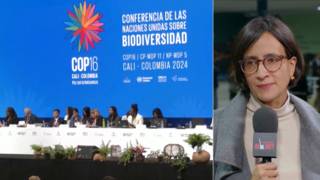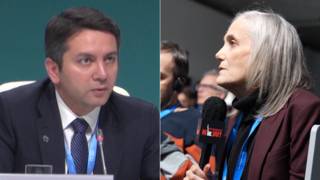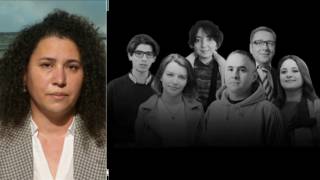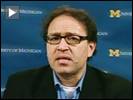
Related
Topics
Guests
- Hisham MatarRenowned Libyan novelist based in London. He is the son of a prominent Libyan dissident. He has spent the last several days helping run an ad hoc news desk informing the Western media of events occurring in Libya. His debut novel, In the Country of Men, was shortlisted for the 2006 Man Booker Prize.
Libyan dictator, Colonel Muammar Gaddafi, vows not to leave the country as opposition protesters take control of key cities. After a week of demonstrations, thousands of protesters have been killed or injured by pro-Gaddafi police and hired mercenaries, and more than a thousand people are missing. For more on Libya, we are joined from London by Hisham Matar, a renowned Libyan novelist. He is the son of a prominent Libyan dissident, and he is currently helping to run an ad hoc news desk informing the Western media of events occurring in Libya. “The world now is watching a massacre, and history will hold the international community responsible,” Matar says, “not only because we are watching a dictatorship, an unelected dictatorship, massacring its own people, but we are watching a dictatorship that the world has profited from close relations with.” [includes rush transcript]
Transcript
AMY GOODMAN: In Libya, the government continues its brutal clampdown on the growing uprising against the four-decade rule of Colonel Muammar Gaddafi. In a rambling speech aired on state television Tuesday, Gaddafi vowed to fight to his “last drop of blood” rather than leave the country.
MUAMMAR GADDAFI: [translated] I will not leave the country. And I will die as a martyr at the end.
AMY GOODMAN: During his speech, Gaddafi called protesters “rats” and “mercenaries” who wanted to turn Libya into an “Islamic state,” and said enemies of the country “should be put to death.” He also called on his supporters to take back the streets from anti-government protesters.
Gunfire was reported this morning in the capital of Tripoli, and Human Rights Watch says witnesses there describe Libyan forces firing “randomly” at protesters in the past couple of days.
Gruesome photos from Libya have surfaced of burnt corpses and protesters hacked apart. The death toll in the country is unknown, but witnesses reported scores dead. The International Coalition Against War Criminals estimates more than 500 people have been killed, 4,000 wounded, and at least 1,500 missing in Libya since demonstrations began last week.
Several high-ranking Libyan diplomats around the world have resigned. The man considered the Colonel’s number two, Interior Minister Abdul Fattah Younis al Abidi, is among senior figures who have joined the opposition. There are also reports that many top military brass and low-ranking soldiers have defected. Major cities across Libya, including Benghazi and Tobruk, are now reportedly under the control of the opposition.
For more on Libya, we’re joined from London by Hisham Matar, a renowned Libyan novelist. He’s the son of a prominent Libyan dissident, and he’s currently running his own ad hoc news desk informing the Western media of events occurring in Libya.
Welcome to Democracy Now!, Hisham Matar. What is the latest you understand is happening in your country, in Libya?
HISHAM MATAR: Well, the latest is that I think what we’re witnessing is the violent lashings of a dying beast, who is willing to go to extreme measures in order to try to cling on to power. It’s definitely unraveling, but the question that remains is that how many more people will this man kill before he either leaves or meets his end, one way or the other. That seems to be the question. And although, yes, most of the East now is under the control of the people, who were demonstrating peacefully in the beginning, before they were attacked, he controls Tripoli, of course. And Tripoli is the central — it’s the capital of the country. And he is hiring mercenaries to fly planes and bomb demonstrators, fire from the air on demonstrators.
There’s a palpable sense of fear. I think the country is actually going through — I think we’re going to live with this trauma for a long time. You know, there’s terrible eyewitness accounts of people huddled in their flats, watching these mercenaries walking up and down the streets with yellow hard caps. I mean, Orwell couldn’t have made it up. And they’re hitting people with sticks and machetes and hammers. And there’s this kind of sort of — I think it’s the recklessness of it and the kind of madness of it that has disturbed most of us.
AMY GOODMAN: Can you talk about Gaddafi’s speech yesterday, and where he gave it in Tripoli?
HISHAM MATAR: Well, he gave it in the part of his big camp in Tripoli where it’s basically a military base, but he lives in the middle of it, which I think says quite a lot about his rule and the nature of his rule and how people view it, that he feels only safe living in the middle of a military camp in the heart of the capital. Part of it was bombed in the air raids that Reagan ordered in the late ’80s, in which several people died, of course. And it was a great gift for Gaddafi, because what it did is it gave him this kind of heroic, kind of man in the third world fighting the great empire kind of image, which is far from the truth about his real [inaudible] —
AMY GOODMAN: And his daughter was killed in that bombing, right?
HISHAM MATAR: Adopted daughter was killed, absolutely, yes, and many people injured. It was a terrible event. And so, what he did was he memorialized the event by keeping the bombed-out building. And so, it’s very symbolic that he was in it yesterday, because he’s basically saying, you know, “I am fighting not my people here. I’m fighting foreign powers that have hired these people to come and depose me.”
What’s interesting is that everything — you know, there’s kind of — there’s, of course, specific different peculiarities about all the speeches that were given by the three dictators that we saw — you know, Ben Ali, then Hosni Mubarak in Egypt, and Mubarak — and Gaddafi, I mean. But there are some similarities. And the similarities are that they all confuse the word “Libya” or “Egypt” or “Tunisia” for themselves. And so, when they’re speaking about the country, they’re really speaking about themselves. And Gaddafi was doing that all the time yesterday. And he was sort of — I mean, it struck me that he was actually being — at that moment during the speech, he is being the victim of his own contradictions and the victim of his own reality, a reality in which, for a long time, this man is surrounded by people who agree with him, who are, for one reason or the other, either because they’re benefiting or they’re frightened, tell him that he is always right. And that’s kind of a — it’s a terrible fate, I think.
AMY GOODMAN: Can you talk about the U.N. and what it has done and its significance, the U.N. Security Council issuing a statement urging the Libyan government to end the attack on demonstrators, and then the Libyan diplomats around the world who are resigning?
HISHAM MATAR: I think, yeah, you know, I believe that most of the Libyan diplomats resigning are resigning because they’re genuinely shocked by the reality of how bad this regime is. But I think a lot of them are resigning also because they want to be on the right side of history, and they can see that the ship is sinking. In fact, the ship has been sinking for a few years. You know, there’s been — lots of Libyan diplomats and very senior people in the government have been behaving in a way that suggests that they did sense this coming. So they’ve been sending abroad a lot of money. They’ve been stealing in a way that is just far more nakedly and just on a very large scale.
But as far as Europe is concerned, I think there’s kind of — you know, all of these announcements that we heard that have been very high on sentiment, saying all the right things, but very low on action, I think all that says much more about the corrupt nature of the relationship between Europe, America and the Gaddafi regime than it does about Europe and America, actually. It says much more about that very strange relationship that they’ve had, a kind of a parasitic relationship, in which they were prepared to do business and therefore strengthen the legitimacy, but also the power, of this regime that was oppressing its people and killing its people and funding, you know, various different terrible projects abroad.
AMY GOODMAN: We’re talking to Hisham Matar, a novelist, Libyan novelist, based in London, now, with a few others, has set up an ad hoc news group to get people’s accounts from Libya out into the media. What is your understanding of the numbers of casualties, Hisham?
HISHAM MATAR: That’s difficult to verify, Amy. And I spoke to one doctor in a Benghazi hospital three days ago. So, three days ago, when the death counts were officially — when the conservative accounts were saying that the death toll was somewhere around 200. Well, when I spoke to this doctor, he said to me that he had seen 200 bodies in his hospital alone. So it’s very difficult to know.
What is very clear is that this is actually part — although the scale is incredibly horrific, and we’ve never seen anything on this scale before in Libya, these kind of tactics are familiar to us. You know, Gaddafi bombed Darnah in the '90s when there was an uprising there. Of course, then there weren't mobile phone pictures going out on Twitter and Facebook; it was sort of a silent event that was hardly reported on, even in the Arabic media. Nobody could verify it. And then, of course, in 1996, he bombed — sorry, he issued orders to assassinate — to execute, summary executions of 1,200 political prisoners in Abu Salim prison, so — again, because they had had a demonstration in the prison. So, this is kind of a familiar tactic; it’s just the scale is much larger. And I suspect, when all is said and done, I would be very surprised if the death count is not much higher than what we’re being told today, which is, as you reported, somewhere around 500.
The Libyan revolution is — I think it’s unique, because Libya is far smaller than Tunisia and Egypt. Tunisia — Libya is only six-and-a-half million people. Yet, in fewer days, today is just — the revolution is only a week old, yet we’ve seen the number of deaths is just much higher than Egypt and Tunisia. And what that says is that it says actually exactly what Seif al-Islam, in his equally bad speech that he gave, Gaddafi’s son, that he gave before his father’s speech, in which he said, you know, Libya is not Tunisia, Libya is not Egypt. And his idea was that Libya is somehow unique and therefore can be ruled in this way forever by his family. But actually, I agree with him that Libya is not Tunisia and not Egypt, in the sense that the Libyan dictator has shown himself to be prepared to kill as many people as he needs to in order to cling on to power, which worries me, because this is — it’s become an emergency now. That’s why these kind of, you know, polite, didactical conversations that are going on in Europe about, “Oh, was it correct for us to have become friends with him in 2003? Should we perhaps, you know, not get so close to dictators like him in the future?” — all that is completely inappropriate and self-indulgent, as far as I’m concerned, because it is an emergency. You know, more people will continue to die if nothing is done.
AMY GOODMAN: Hisham, your father, a political dissident in Libya?
HISHAM MATAR: Yes, my father was a political dissident, and he was kidnapped from his home in Cairo, where he lived in exile, by Egyptian secret service police, who then handed him over to the Libyans. There was a deal done. The Libyans also handed over other Egyptian dissidents hiding in Libya. And money was exchanged. My father was taken to Libya immediately. He was imprisoned in Abu Salim prison, which is an infamous kind of terrible political prison in Tripoli.
AMY GOODMAN: What year was this?
HISHAM MATAR: This was in 1990, March 1990. And he was tortured and imprisoned. And we didn’t know of this. We didn’t know where he was, because the Egyptians lied to us, said that he was actually — they were keeping him in Egypt, and it’s for his own good — the other option would be sending him to Libya — and threatened us to remain quiet. You know, “If you speak, we can’t guarantee his safety,” things like that. So, we were in limbo as a family and, you can imagine, incredibly worried, concerned, not really sure what is the correct thing to do. You know, if we speak, are we really risking his safety? And if we don’t speak, are we somehow becoming complicit with what is happening to him? And about three years into this terrible time, we received a letter that my father smuggled out of Abu Salim prison, in which he detailed everything that happened — when he was taken, the people that took him, and so on. And that’s when we started campaigning very actively.
AMY GOODMAN: What do you think countries should do right now, Hisham?
HISHAM MATAR: What do I think what? I’m sorry?
AMY GOODMAN: Countries should do right now about what’s happening? And what did you learn was the fate of your father?
HISHAM MATAR: Well, I don’t know. My father has been subjected to what the U.N. call “enforced disappearance,” political prisoners that are imprisoned and then just vanish into the prison system. I don’t know if my father was killed in 1996 in the massacre that I mentioned, and I don’t know if he was moved somewhere else. So I don’t know whether my father is alive or dead. And it’s this kind of level of contempt that the regime has for anybody that disagrees with them.
You know, there was something actually that — about the speech yesterday, with Gaddafi’s speech. He went on about, you know, “This is a problem, that people didn’t understand what the revolution was about. People didn’t understand what I was talking about.” You know, so it’s like disagreement is always about you not listening. And this reminded me of a terrible detail that my father included in his letter, where, in the middle of the ceiling in the cell where he was imprisoned, they had placed a loudspeaker. And this loudspeaker would play from 6:00 in the morning 'til the end of the night. So, from 6:00 ’til midnight they would play Gaddafi's speeches and revolutionary songs and slogans. So it’s sort of — the idea is that you didn’t disagree with us because you actually disagreed with us legitimately; you know, you disagreed with us because you’re stupid, you didn’t understand. And that kind of attitude that the regime has towards its people now, it’s just taken a completely different, grotesque scale.
And I think the world now is watching a massacre, and history will hold it responsible, will hold the international community responsible, because — not only because we are watching a dictatorship, an unelected dictatorship, massacring its own people, but we are watching a dictatorship that is — that the world has profited from close relations with. When America and Britain were keen on getting their oil contracts, they moved much faster. They did much more. They were involved in a very active, you know, enthusiastic way. When Gaddafi starts killing his people, nobody knows what to do. I am kind of slightly sort of sympathetic, actually, with Mr. Obama, because he knows that if he comes out and speaks in very clear terms about Gaddafi, it will probably make things worse for the Libyan people. But what that says, actually, what that says, is that the whole enterprise of engaging with somebody like him in the way that they did, and giving him international legitimacy, not only makes life difficult — or, no, it makes life slightly inconvenient for America, but it has made life hell for Libya. You know, it’s given the regime eight more years into power than it needed.
AMY GOODMAN: Hisham Matar, I want to thank you very much for being with us, and of course we’ll continue to follow events taking place in Libya. Again, we don’t know how many are dead. It could be over a thousand, could be 500, could be well of a thousand missing now and thousands injured. Thank you so much for being with us, Hisham Matar, a novelist based in London, putting out news to Western news agencies, spent the last several days running his own ad hoc news desk about events occurring in Libya.
This is Democracy Now! When we come back, our own Sharif Abdel Kouddous has returned from Egypt. We’ll get the latest. Stay with us.












Media Options